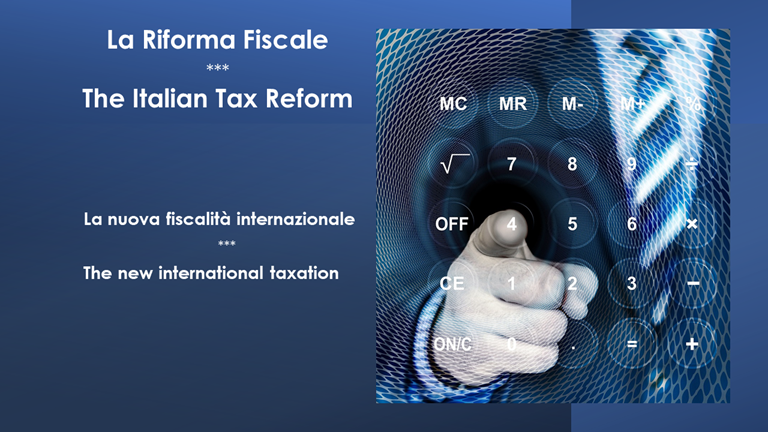

With reference to the residence of individuals, the intervention reshapes the cardinal principles of the assumptions of tax residence, while maintaining the approach towards non-cooperative countries (see e.g. the presumption of residence for ‘blacklisted’ countries). AIRE registration, implementing the best doctrine and the pressing case law, is no longer a necessary condition for the loss of residence, but a relative presumption is inserted, then basing the judgment on substantive issues, as per international practice.
With reference to the residency of companies and entities, the intervention implements the OECD and EU guidelines by abandoning the criteria of place of administration and principal object, and inserting the concepts of ‘effective management’ and ‘ordinary principal management’, always temporally anchored to the greater part of the tax period. Both of the aforementioned definitions are provided with the due definitional framework by the law. A strong safeguard is left against so-called ‘esterovestizione’. For collective investment funds, the new text provides that ‘they are considered resident if they are established in Italy‘. For trusts and institutions with similar content, the relative presumption remains in place to consider as resident in Italy trusts established in States and countries that do not allow an adequate exchange of information when, subsequent to their establishment, a party resident in the territory of the State transfers in their favour an immovable property or real property rights in Italy. However, it is clarified that this is without prejudice to the possibility of providing proof to the contrary.
The issues are commented extensively in the dedicated articles on our website and we are of course available for any clarification. The reform is important and relevant and may make it possible to remodel, along business lines, the corporate and governance architecture of business groups, so as to avoid interpretative conflicts with the Administration.
The government’s intervention then concerns other provisions, including the rules for the so-called Controlled Foreign Companies (CFC), state aid, impatriates and so-called reshoring.
With regard to the CFC, the government text makes the changes necessitated by the implementation of the so-called Global Minimum Tax, also incorporating some suggestions of practice with the effect of giving weight to the comparison between the foreign effective tax rate and the Italian virtual tax rate, when taxation is below 15% (global minimum tax rate). This has a significant impact especially for holding companies, which were penalised in the previous draft.
With regard to the rule on the so-called impatriates, while taking on board many of the constructive criticisms received, the final choice is to end the current regime with 31 December, while maintaining acquired rights. As of 1 January 2024, the new impatriate regime will only concern high-potential individuals with particular professional qualifications or degrees (Legislative Decree No. 108 of 28 June 2012 and Legislative Decree No. 206 of 9 November 2007) who earn salaried or assimilated income and self-employment income produced in Italy under certain conditions. The decree provides a transitional rule for those who had really planned to move by 2024 by purchasing a property of first residence and confirms the so-called ‘grandfathering’ to those who entered by 31 December of the current year in the current impatriate regime, maintaining the related rights. The final choice was to severely limit the intra-group movement of human capital, and frankly, one cannot understand the reason for this. The subject is explored in detail in the dedicated article.
The reform incentivises the transfer of economic activities to Italy (so-called reshoring). The decree seeks to intervene in the competitive scenario also set by other EU states, by providing a 50% reduction of taxation (IRES and IRAP) for companies and professions carried out in an associated form in a foreign country (non-EU and non-EEA) that relocate to Italy.
Finally, the reform transposes Council Directive 2022/2523, dated 14 December 2022, on global minimum taxation. This deals with the substantial subject of the implementation of the so-called ‘global minimum tax’ in Italy, for which there is extensive postponement. Clients will receive due support on the subject, as will those who are interested.
The firm’s partners will be happy to support you in understanding this important international tax reform and its impact on your private or business life.
All provisions will apply as from 1 January 2024.








